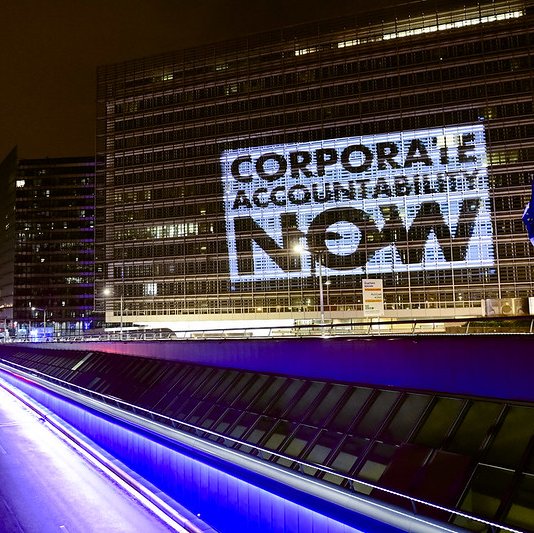Towards an EU mandatory due diligence & corporate accountability law
EU Parliament, Council and Commission negotiators reached a political deal on the Corporate Sustainability Due Diligence Directive on 14 December 2023. A joint press conference took place at 11 am CET. Civil society welcomed the agreement as a landmark moment for human rights and environmental protections in business, but criticised several serious loopholes including the exemption of financial activities from the due diligence obligation. For ongoing NGO and other reactions to the deal, analysis and further developments after 14 December, please refer to this story.
For background leading up to the political agreement on 14 December, please see the timeline below.
Background
On 29 April 2020, the European Commissioner for Justice, Didier Reynders, announced that the Commission commits to introducing rules for mandatory corporate environmental and human rights due diligence (mHREDD), as part of a Sustainable Corporate Governance initiative. The announcement was made during a high-level online event hosted by the EU Parliament’s Responsible Business Conduct Working Group, during which the Commissioner presented the findings of the Commission study on options for regulating due diligence requirements. You can watch the webinar here.
MEPs, NGOs and other stakeholders welcomed the announcement. In December 2019, over 100 organisations had launched a campaign calling for EU human rights and environmental due diligence legislation. See the joint NGO statement on principal elements of an EU due diligence legislation here.
In December 2020, towards the end of the German EU Council presidency, the Council called for a proposal from the Commission for an EU legal framework on sustainable corporate governance, including cross-sector corporate due diligence obligations along global supply chains. See here for a due diligence webinar series supported by the Portuguese EU presidency (1 Jan - 30 Jun 21).
In response to the EU Commission's announcement, Members of the European Parliament started working on developing a European Parliament (EP) position on the shape such a law could take. On 27 January 2021, the EP Committee on Legal Affairs (JURI) adopted a report including recommendations to the Commission on mandatory corporate due diligence and accountability. The final report was adopted on 10th March. CSOs welcomed it as a strong signal from the European Parliament but said the Commission will have to go further in its upcoming legislative proposal.
On 8 February 2021, the Commission concluded a public online consultation on its Sustainable Corporate Governance initiative. The publication of the Commission's legislative proposal was scheduled for October 27 and then moved to December 8, before being delayed further again.
In December 2021, business and human rights experts and leaders addressed a joint statement to President von der Leyen and the EU Commission expressing concerns at the numerous delays. In February 2022, over 100 companies, investors, business associations and initiatives released another statement urging the EU to swiftly adopt a legislative proposal on effective mHREDD.
On 23 February 2022, the Commission published its proposal for a Corporate Sustainability Due Diligence (CSDD) draft directive.
The file then went to the European Parliament and the Council for their consideration, and adoption of positions. The EP lead committee's (JURI) draft report was published on 7 November 2022. Draft and final opinions from several other EP Committees as well as amendment proposals are available here. The Council adopted its general approach on 1 December 2022.
On 11 April 2023, more than 20 leading businesses and networks released a joint statement urging MEPs to adopt a text that is more closely aligned with the international standards of the UN Guiding Principles and the OECD Guidelines for Multinational Enterprises.
On 25 April 2023, the European Parliament Legal Affairs Committee (JURI) adopted its position on the CSDDD, which better aligned the law with the international UN and OECD standards, although loopholes remained. The JURI report was adopted in plenary on 1 June 2023, with 366 votes in favour, 225 against, and 38 abstentions.
Trilogue negotiations between the three EU institutions on a final law followed. As negotiations reached their final stages, NGOs reiterated the importance of including financial activities, climate impacts, environmental due diligence and safeguarding indigenous peoples' rights, including their right to free, prior and informed consent, among other issues. There was renewed support for the CSDDD from business including finance.
Further materials and information are available in the timeline below, in our blog series Towards Mandatory Human Rights Due Diligence, and on our mandatory due diligence portal.
White smoke after 16+ hours of negotiations. We have a deal on EU-wide #duediligence legislation! A big step towards putting people before profits - and to making responsible business the norm. pic.twitter.com/DnHAPT1fVf
— Lara Wolters (@larawoltersEU) December 14, 2023
